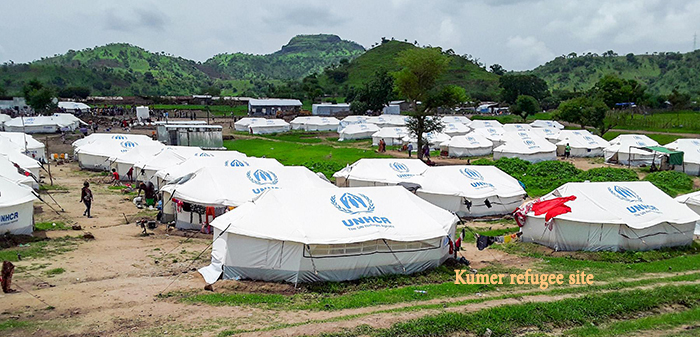
Significant Increase in the Number of Sudanese Refugees to Ethiopia
moatinoon
The High Commissioner for Refugees stated that the number of Sudanese refugees in Ethiopia has increased by 41% since the beginning of January 2024, compared to the months of November and December 2023.
It was clarified that 278 families crossed the entry point in Karmak and Qaysan to the Bani Shangul-Gumuz region, and 276 families, consisting of 926 individuals, were registered. Additionally, two families were registered in the Sherkole camp after crossing through Qaysan. Women constitute 53% of the families, and children under 18 years old make up 62%. Furthermore, 27 unaccompanied and separated children were registered among the new arrivals.
In the Metemma region on the Ethiopian side in the Amhara region, 149 families consisting of 309 individuals from Sudanese, South Sudanese, and Eritrean nationalities were registered. Also, 240 families consisting of 504 individuals were registered at the Komer refugee site.
New arrivals are transferred from the entry point in Metemma to the Komer refugee site daily, where they are provided with hot meals or high-energy biscuits upon arrival before being transported by the International Organization for Migration to the Komer refugee site. However, new arrivals heading to Bani Shangul-Gumuz, through the entry point in Qaysan to the Sherkole camp, are transferred by the International Organization for Migration for registration and other services. Those crossing through Karmak remain in place until the development of the new land allocated by the regional government for the camp and the relocation of those coming from Karmak to it.
Regarding the nature of shelter and basic relief materials in the camps, a total of 1,623 individuals, forming 863 families among the newcomers to Komer camp, received 3,257 pieces of soap, 3,081 sleeping mats, 1,154 cooking utensils, 1,479 mosquito nets, 1,152 buckets, 1,005 solar-powered lamps, and 1,701 blankets.
Child and Women Protection
Due to the increased number of unaccompanied children, social workers and local community structures play a crucial role in child protection. A total of 175, including 71 girls, were registered among recently separated children, and the total number of at-risk children reached 946, including 414 girls.
In Karmak, a total of 175 children were identified for special care, and so far, 797 children have been processed.
Regarding gender-based violence, the High Commissioner explained that the response services to gender-based violence provided by World Vision Ethiopia continue to support survivors identified with psychological and social support, along with other assistance.
Awareness assistance included the distribution of information, education, and communication materials on gender-based violence, sexual exploitation, and sexual abuse in three languages (Arabic, English, and Tigrinya) to 200 newcomers at the Metemma entry point.
Three women protection groups (Sudanese, Eritrean, and South Sudanese) were established in Komer to enhance womens protection from gender-based violence and discrimination. Additionally, the International Rescue Committee (IRC) organized an awareness session on preventing exploitation and sexual assault, along with reporting mechanisms, for 555 individuals in Karmak.
Multi-purpose cash assistance was provided to 691 individuals, with 6,300 birr each, at the crossing point and Komer. This includes people with disabilities, unaccompanied and separated children, the elderly, survivors of gender-based violence, malnourished children, and women heads of households. Cash assistance was also provided to 208 mothers with children under two years old in Komer, amounting to 1,700 birr per mother.
Regarding health and nutrition services, the International Medical Team (MTI) and World Vision Ethiopia (WVE) provide assistance in Komer camp through Mobile Health and Nutrition Teams (MHNTs). In addition, MHNTs under UNICEF, MTI, and WVE help deliver primary health and nutrition services on-site.
External clinic consultations in Komer reached 471 adults, including 259 refugees and 60 citizens, and 146 children. In Karmak, consultations were provided to 420 adults.
Common diseases among children under five years old include acute upper respiratory tract infections (AURI), diarrhea, pneumonia, malaria, and intestinal worms. As for adults, prevalent diseases include upper respiratory tract infections, acute upper respiratory tract infections (AURI), malaria, intestinal worms, diarrhea, intestinal parasites (IP), and dyspepsia.
Educational sessions on mental health and psychosocial support (MHPSS) were conducted for a total of 555 individuals in Karmak by the mental health and psychosocial support officer to raise awareness about suicide, depression, epilepsy, and psychosis. The distribution of high-energy biscuits to newcomers in Karmak and Komer continues. The World Food Programme in Komer supplies food aid.
Water, Sanitation, and Hygiene (WASH)
During the reporting week, Catholic Relief Services provided 513 cubic meters of chlorinated water at the two crossing points and Komer. This represents a decrease compared to the previous week (603 cubic meters), with an average of 10.6 liters per person per day, significantly below the emergency standards set by the commission (15 liters per person per day).
However, Catholic Relief Services established a new water filling station in the municipality of Jondyuha, operational since January 12, 2024. This station aims to reduce the daily distance covered by water trucks (33 km) and related costs, ensuring water supplies in Komer.
To facilitate communications, additional points were installed and activated to improve communication at the commission headquarters, in the Komer camp. Work is ongoing to set up a small infrastructure room for the information technology network and the backup power system (UPS).

